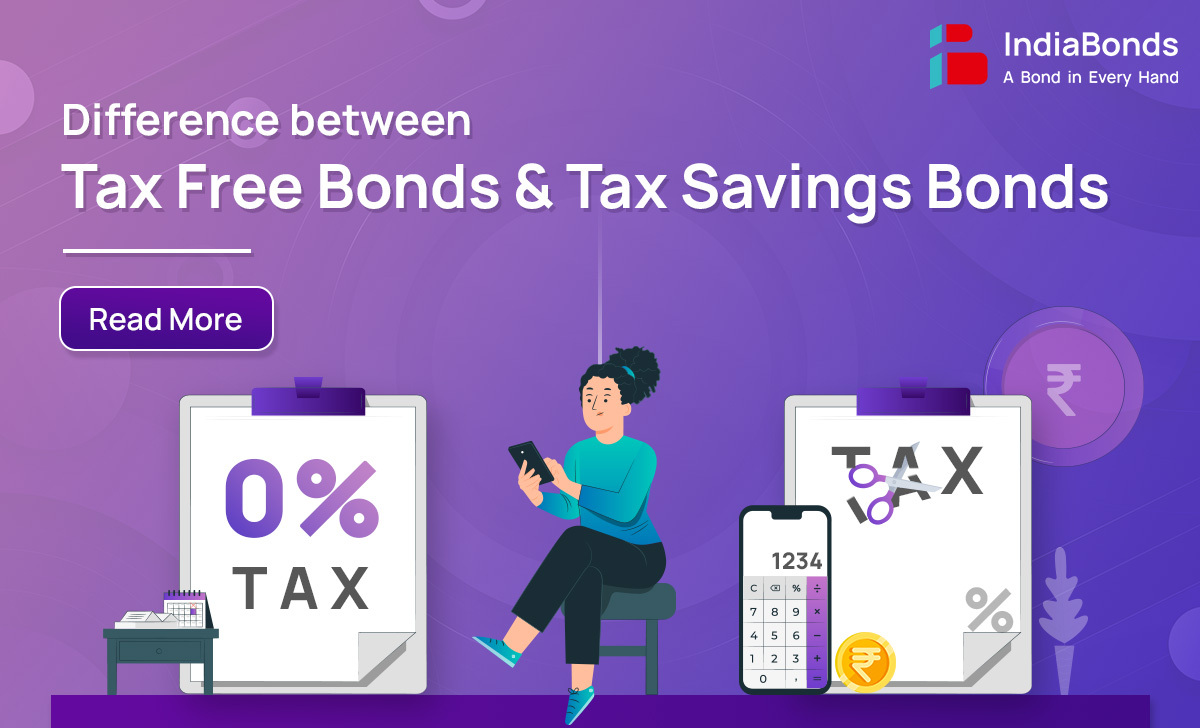Difference between Tax free bonds and Tax Savings Bonds

In this world nothing can be said to be certain, except death and taxes.
–Benjamin Franklin
This quote reflects the inevitability of these two things in life. Death is inevitable for all living beings and taxes are a necessary part of modern society. Taxes are a way for the government to collect revenue, which is used to fund various public services and infrastructure projects. Without taxes, it would be difficult for governments to provide essential services like healthcare, education, public safety, and transportation. In India, taxation has been a significant issue for many years. The country’s tax system has different taxes levied at various levels. Investors seek out tax saving instruments as a means to reduce their tax burden. Tax saving bonds and tax free bonds are two commonly discussed options to reduce one’s tax liability. However, investors often confuse tax free bonds and tax savings bonds. Both offer tax benefits, but in different ways. They have varied characteristics and features. In this article, let’s discuss the difference between tax free bonds and tax savings bonds in detail.
Tax free Bonds
Tax free bonds are debt securities issued by government entities that are available to the public. As the name suggests, the interest income earned from tax free bonds is exempt from taxes. Several government-owned entities have issued tax free bonds, which can be held in demat mode. These bonds are issued for generally long-term maturity periods. Historically, government agencies commonly issued tax-exempt bonds to obtain long-term capital for the construction and maintenance of critical infrastructure and utilities.
When it comes to tax savings bonds, there exist two categories of bonds that facilitate tax-saving:
Tax savings bonds u/s 80CCF
Tax saving bonds or ‘infrastructure bonds’ are investment instruments designed to help individuals save on taxes. These bonds are ideal for those with low risk tolerance who wish to preserve their income in the long run and benefit from tax savings. In the union budget of 2010-11, a new section, 80CCF, was introduced in the Income Tax Act of 1961. This section provides for income tax deductions for investing in long-term infrastructure bonds. These bonds provide investors with tax deductions up to Rs. 20,000 which reduces their taxable income. However, it’s important to note that the interest earned on these bonds is taxable. It is also imperative to note that the deduction offered under section 80CCF is in addition to the tax deduction under section 80C, which offers tax benefits up to Rs. 1.5 lakh. It is worth noting that the option to claim a deduction for investing in tax savings bonds was terminated starting from the fiscal year 2012-13. The deduction is no longer applicable.
Capital gains exemption bonds u/s 54EC
Capital gains bonds are bonds issued by the government backed institutions such as IRFC, PFC and REC that enable investors to invest the capital gains made from selling a property and save taxes on those gains. To know more about 54EC bonds, click here.




Tax Free Bonds vs Tax Savings Bonds
Tax free bonds and tax savings bonds are both investment options that offer tax benefits to investors. But there are some distinct differences. Here is a comparison of the two investment options:
| Tax Free Bonds | Tax Savings Bonds | |
| Feature: | Interest generated is completely tax free | Provides tax benefits on the principal amount |
| Interest Rate: | Generally higher than other tax saving bonds and the interest income is tax free | Relatively lower than tax free bonds and the interest income is taxable |
| Tenure: | Usually long-term, with maturities ranging from 10 to 20 years | Usually medium-term, with maturities ranging from 5 to 10 years |
| Lock-in period: | No lock-in period. These bonds can be eventually sold in the exchange. If sold before maturity date, capital gains tax applies | 5 years lock-in period. Investors can’t sell their bonds before maturity |
| Section of Income Tax: | Section 10(15) | Section 80CCF |
| Tax Benefits: | Interest income is tax free. No tax deduction at source (TDS) on interest income | Interest income is taxable. Section 80C of the Income Tax Act allows investors to claim tax benefits up to a maximum of Rs. 20,000. |
In summary, both tax free bonds and tax savings bonds offer attractive tax benefits to investors. Tax free bonds are issued by government-backed entities and offer tax free interest income. Tax savings bonds, on the other hand, offer a relatively low interest rate, have a medium-term maturity period and a lock-in period of 5 years. Moreover, interest income earned from tax savings bonds is taxable but allows investors to claim tax benefits under Section 80C of the Income Tax Act.
FAQs
Q. Tax savings bonds vs tax free bonds; which is better?
A. The tax savings bonds have been discontinued. But when it comes to tax planning it is subjective and ideally depends upon the investor’s financial goals, income and time horizon.
Q. How do I purchase tax free bonds?
A. To purchase Tax Free Bonds online, the first step is to sign up on Indiabonds.com
- Complete your KYC online in less than 3 mins! There is no need to complete any paperwork or make any uploads.
- Browse the curated packs and select Tax Free Bonds on the explore Page to view a variety of Tax Free Bonds for investments
- Pick your choice of Tax Free Bonds from a curated list of Tax Free Bonds on our website.
- Click Read more to get detailed issue reports like interest payment frequency and to calculate your investment as against the final payout.
- Click on “Buy this Bond” and submit your details. The Bond Managers will help you with the rest. That’s about it.
- In case you are not sure how to invest in Tax Free Bonds, you can reach out to our Bond Managers who will help you buy Tax Free Bonds online.
Disclaimer: Investments in debt securities/ municipal debt securities/ securitised debt instruments are subject to risks including delay and/ or default in payment. Read all the offer related documents carefully.
















































